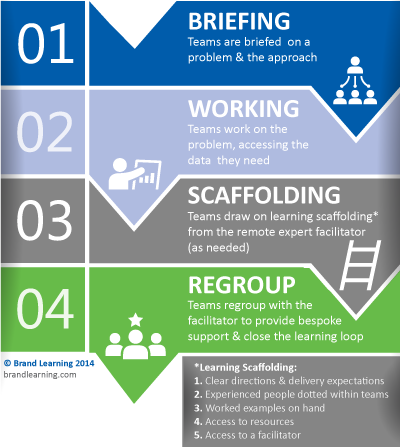Every so often a capability brief comes along with challenges so high, it sets my senses tingling. I know it’s an opportunity to do something big.
- "How can we instil a pioneering mindset which challenges all our assumptions?"
- "How can we establish aligned & powerful cross-functional team that truly gel?"
- "How can we do this across the world?"
- "How can we incorporate the performance shift into existing work?"
When we’re asked questions like these we keep calm and think big: and not just big, but smart.
These kinds of requests only come from brave clients who understand that their role in building capability is no longer to simply direct and manage learning programme. Rather, it is to enable and support the knowledge build, performance improvement and self-esteem of individuals and teams.
Big requests call for big solutions so when a global client came to us last year saying they wanted all of the above as they had lost over 50% share overnight in due to a competitive launch, we worked with them to run a programme with a very different approach to their learning strategy: Guided Discovery.
So what is Guided Discovery all about?
The clue is in the title. Teams work on important real job-based problems and discover effective solutions and learnings, for themselves. A remote expert facilitator provides the perfect type and scale of resources and support needed to get the job done and for participants to learn at the same time. A win:win if ever there was one.
This diagram explains the flow of a typical Guided Discovery programme.

In our case, we had the perfect ‘storm’ of learning ingredients. Our clients were experienced operators, who had a good knowledge of best practice and needed to take it to the next level, quickly, to ensure their corporate survival.
We constructed a powerful programme design which consisted of 4 phases:
1. A self-assessment phase to determine & establish the scale of the task and learning needed
2. A Guided Discovery phase to deliver against the requirement which in our case was creation of a customer-centred strategic plan
3. A final workshop to close any learning needs and align on action
4. An active program to embed agreed actions and sustain the change
The great benefits of Guided Discovery are that:
- As it’s a real task, there is automatic motivation and engagement built in
- As it’s collaborative (different participants can perform different roles and take on complimentary tasks in looking at a shared problem), it builds powerful teams
- As it’s inductive (the participants pull the learning from their experiences rather than having learning pushed at them), the learning sticks
- As it’s a more personal & fluid experience, it builds the personal skills and confidence in dealing with further challenging problems back in the workplace
But there are, as with any learning approach, some trade-offs. The watch-outs are:
- Groups need to understand the type of learning experience they will be embarking upon. Ideally the problem will be so compelling that they want this approach as it’s fast & real as it requires active and prolonged commitment
- This type of learning strategy does need some explaining, as for some participants it can feel too challenging being active constructors of their learning, as opposed to being passive recipients
- For some less experienced team members, the cognitive load can be too high and they simply deliver outputs to requests along the Guided Discovery path rather than being able to assimilate the whole experience. Choose your participants wisely
- You have to ensure that the facilitator can be totally responsive to any learning needs whilst the Guided Discovery is ‘in train’ and at the concluding event. They have to be completely competent in being everything from a process coach to a content consultant
With our client, this Guided Discovery approach has been rolled out successfully across now 3 continents and not only has it solved critical business problems; it has fast-tracked individual learning and performance improvement. Even beyond that, we have shown the leadership of the global business what active and immediate contribution the Capability Team has on the business bottom line.
We recommend, as you put together your learning plans and find ways to respond to pressing business issues, that you consider Guided Discovery as an approach in your organisation. For other ideas of how to innovate in your learning plans, read these 5 hot tips.
Keep calm, think big & get big results!
This post is by Martin Adkins, Sales Capability Director at Brand Learning

